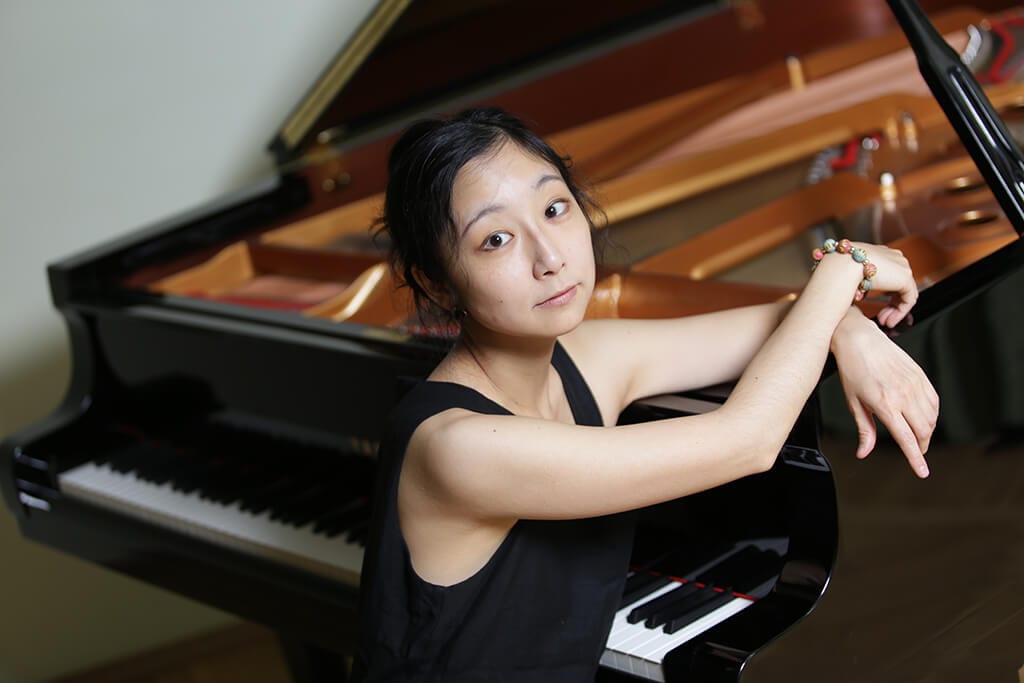The pianist Maki Sekiya gave a concert the other day in Oxford that has to be one of the most fascinating and memorable musical events I have attended in a great while. It confirmed my previous sense that she is a very special musician and I came away feeling I had had at least two major revelations. The concert took place in the Jacqueline de Pré Music Building in the grounds of St Hilda’s college, which is intimate, has a fine acoustic, and constitutes a major benefit for people living in Oxford who like chamber music. It is also a central location for the increasingly important annual Oxford Piano Festival and Summer Academy, about which more another time.
The first revelation of the concert on 12 May 2017 was that included an instrument I had never heard before, called the Theremin. Maki accompanied Russian-born Lydia Kavin, Theramin Virtuoso Extraordinaire, who is one of the world leaders in playing this unusual instrument, invented by Léon Theremin. This utterly modern instrument is electronic, attached to an amplifier and speaker, and seems to work as an electric field. With her right hand, Kavina seemed to be playing invisible strings as one might finger a cello or bass fiddle; with the other hand she seemed to be shaping the sound like a conductor. The sound itself is eerie. Kavina’s strong technique enabled the eery sounds to be constantly in pitch, which must take a great deal of skill. The sound of the Theramin put me in mind a bit of the glass harmonica. The first piece for this instrument was called Wind from the East by Andrew Popoff, a contemporary Moscow composer and music journalist. A three-movement Suite for Theremin and Piano, it was written in 2012. It was captivating and utterly magical; and Maki Sekiya’s accompaniment was exquisite and somewhat self-effacing, putting the spotlight on Kavin. This music closed the first part of the concert and people talked a lot about the revelation of hearing this instrument during the interval and of wanting to hear it again. Accompanied by Maki, Lydia Kavina played two more pieces for the instrument by contemporary Russian composers in the second half of the concert. Iraida Yusopova’s Kitezh-19 and an encore were striking and enjoyable enough to justify their inclusion, but I fear I came away feeling that after the startling experience of hearing the Theremin sound the first time, the other two pieces did not add to the experience. From this hearing, I suspect that the expressive range of the instrument – like the glass harmonica? – is limited and that once you have heard it and been startled by the experience there is no further development or revelation to be had. Still, it was fascinating to experience this first time; Kavina was clearly a virtuoso at playing what looked like thin air, and I would love to know if other composers could get more varied results from the invention. Maybe it was simply that Popoff understood how to use this unusual sound better than the other composers whose work was played that night.
The other revelatory experience of the evening was hearing Maki Sekiya play Dmitri Shostakovich’s Piano Sonatas No1 and No 2. As always with this extraordinary pianist, her technique was astonishing, vividly accurate and totally at the service of the music. She seems to play simultaneously from her heart, her intellect and her soul. Her technical precision is breathtaking and utterly reliable, and yet there is nothing cold or detached about it; it is always at the service of the feeling of the music. The communication to the audience is very direct and everyone I spoke with afterwards agreed it is also invoking inward experiences and reactions as they attend to the music. Several people have told me that when they hear Maki play it is a spiritual as well as a musical experience. Her dynamics are astonishing in their range. She has a sure sense of the shape and rhythm of these pieces. She often took risks with the sounding of a note and she seems so completely immersed in Shostakovich’s music making and his personal language that I found myself listening to every note and every nuance as if hearing the pieces for the first time even though I know them extremely well. I found that her interpretation and playing lived up completely to my favourite performances from the past. I found myself simply relaxing into her playing and interpretation with utter confidence. Maki also played as an encore a apiece by Sergey Pavlenko called La musique à bis that was new to me and which I would dearly love to hear again.
Maki Sekiya is teaching and concertizing mainly in Oxford for the moment. I think the time is ripe for her to be launched onto a larger platform; but in the meantime those of us who have managed to hear her feel very privileged indeed. She is a very special and wide-ranging musician.
You can find Maki’s website and hear some of her playing at: http://www.makisekiya.com/

